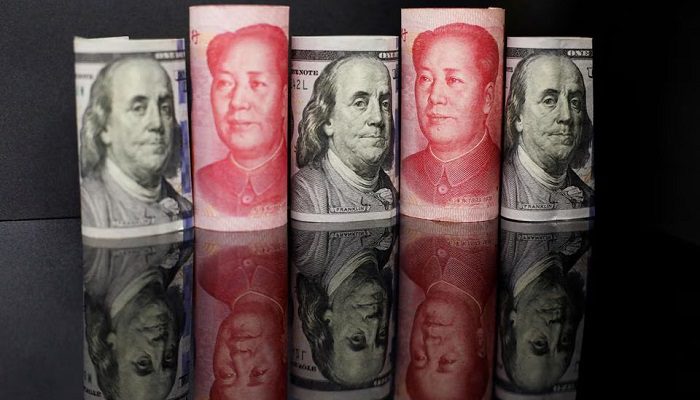There are some Chinese companies that are holding on to the dollars made out of export revenues, while there happen to be some that are turning towards foreign exchange hedging in anticipation of the yuan’s value falling, as per the executives, bankers, as well as data that has been analysed by Reuters.
There are several bankers across China who have told Reuters that their clients are not able to make up their minds in order to convert their export receipts, while the exchange filings demonstrate that more than 30 A-share listed companies have already signed up in order to make use of currency derivatives for hedging risk this year, at least as of date.
The data from the central bank also goes on to show a shift, with dollar deposits in China’s commercial banks, which had gone on to decline across the past year, increasing by $34 billion in January 2023 to attain a figure of $887.8 billion.
The moves happen to be at odds with forecasts from the banks for a rise in the yuan this year as well as broader market expectations that anticipate the fact that the US dollar is going to fall in 2023 and thereby may as well contribute to the yuan’s weakness.
Ms. Zhu, who happens to be the owner of a Shanghai-based exporter of electronic components, said that she is setting the dollar aside and betting that her management of somewhere around $7 million in inflows of US currency will ensure profitability when it comes to her company. Ms. Zhu said that she would need to convert some dollars into yuan in order to make payments to the domestic suppliers. But at the same time, she also feels that she should keep some dollars aside as the yuan may go on to depreciate further.
One of the major airlines in Asia, which has a Chinese origin, is also expecting a bumpy ride ahead. In a stock exchange filing report, the airline said that it plans to hedge around $4 billion worth of currency this year so as to smooth out exchange and other losses that will be up from $850 million.
It is well to note that such moves do not come as a surprise given the volatility of the yuan, as Beijing suddenly went on to unwind its zero COVID plan. Apparently, the currency had gone on to hit a six-month high this year in January before dipping close to the 7 per dollar level.
In response to the yuan’s weakening past 7 against the dollar, the People’s Bank of China’s governor, Yi Gang, remarked that this level does not happen to be a psychological obstacle. In the past years, according to him, the rate of exchange has been volatile at around 4%, and such a rate happens to be the same as in most major economies.
Overall, one can expect the exchange rate of the yuan to be stable at reasonable levels. Notably, the yuan went through its worst year in 2022 since 1994, when China unified markets as well as official interest rates fell to almost 8% as the rising rates of interest in the US diverged from the dipping Chinese ones, thereby supporting the gains in the dollar.






















